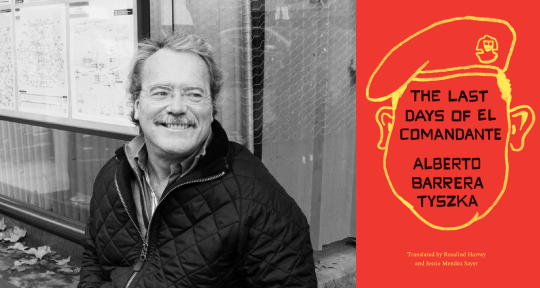In Eduardo Sánchez Rugeles’ startling and tender work of speculative fiction, The Lisbon Syndrome, a comet has demolished the city of Lisbon to nothing, leaving people on the other side of the globe—in Caracas—to reconstitute the erupted world with only a strictly regulated stream of news, an overarching cloak of localized violence, and an unshakable faith in the potentials of storytelling. Translated expertly by Paul Filev, The Lisbon syndrome presents a powerful, telling perspective on the Venezuelan struggle against a repressive regime. In the following interview, Book Club manager Carol Khoury speaks to Sánchez Rugeles and Filev on the unique journey of this text, the learned method of its translation, and the courage and necessity of literature.
The Asymptote Book Club aspires to bring the best in translated fiction every month to readers around the world. You can sign up to receive next month’s selection on our website for as little as USD15 per book; once you’re a member, join our Facebook group for exclusive book club discussions and receive invitations to our members-only Zoom interviews with the author or the translator of each title.
Carol Khoury (CK): Eduardo, how was the novel received when it came out in Spanish—in Venezuela and elsewhere?
Eduardo Sánchez Rugeles (ESR): It’s strange—the novel wasn’t published in the usual way because the English translation came out before the Spanish edition. The Spanish edition will come out later this year, in October, with the independent publisher Suburbano.
I began writing the novel in 2019 and finished it in 2020, and I showed it to a few publishers here in Madrid. It was during the middle of the pandemic, things were really intense at the time, and they told me, “Well, we like the book, but we can’t publish it until 2025, or at the earliest in summer 2024 maybe. If we take it on, you’ll have to wait in line.”
And I was very impatient to have this book published, because the novel was very emotional for me, given that the events in the novel mirrored what was actually happening in Venezuela at the time. I can usually be more patient with my work, but I felt a little anxious to get this book out. A friend read the manuscript—a movie director—and he told me, “I want to turn this into a movie. What do you say—do you want to work on a script with me?”
And I said to him, “Yeah, we can write a script and turn it into a movie, but let me publish the novel first.” But with the pandemic going on, the whole process of getting the book published was very slow. I felt a little sad about having to wait so long to find a publisher, so I started talking with the director, Rodrigo Michelangeli, and one day I said to him, “You know what? I’ll self-publish the book with Amazon. Forget the traditional publishing route. Let’s make this happen.” READ MORE…


